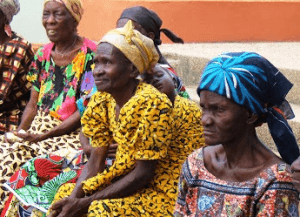 Life is often described in the Bible as one of the signs of God’s blessing.
Life is often described in the Bible as one of the signs of God’s blessing.
One of God’s promises to Abraham was that he would die at a “good old age.” Old age, therefore, should be a crown of honour and dignity.
Yet, we live in a time when it is becoming dreadful to grow old. This is because our society today seems to value youthfulness over wisdom, beauty over experience, and speed over patience.
The potential contributions of the elderly are often ignored, leaving them isolated, disrespected, and in many cases, despised.
The case of the elderly woman is even worse. The proverbial “Old Lady,” once revered as the family
counsellor and custodian of wisdom, is now branded as a witch or burdensome dependent, whose death is sometimes secretly wished for.
What used to be a pillar of family guidance has now become the subject of ridicule and suspicion.
We are gradually raising children to be afraid of their grannies. Their stories and counsel are dismissed as old-fashioned, or “colo,” when in fact those life lessons are the foundation of moral upbringing.
As a result, we are breeding a culture that sidelines the aged, forgetting that someday we too will grow old. Truly, our culture is no longer elderly-friendly.
In ancient Israel, honouring one’s father and mother went beyond words, it extended even to honouring their mortal remains.
As Christians and as Ghanaians, we must reflect on these values and work towards reversing the troubling trends of neglect and ageism.
We must create a society where the elderly are not discarded but encouraged to share their wisdom and life experiences.
A truly elderly-friendly culture offers companionship, support, and opportunities for the aged to continue serving God and society.
Leviticus 19:32 reminds us: “You shall stand up before the grey head and honour the face of an old man, and you shall fear your God: I am the LORD.”
To ignore this command is not only a social failure but a spiritual one.
The elderly should not be seen merely as dependents, rather they have something positive to offer to God and to society.
Their years of experience hold lessons for younger generations, lessons that no textbook or technology can replicate.
But the contemporary Ghanaian culture shaped by Western influences, glorifies the young, the bold, the beautiful, and the strong, while quietly eliminating the value of the aged.
Youth and old age are not competing stages of life; they are complementary. Both the young and the elderly have unique roles to play in service to God and humanity.
While the young bring energy and innovation, the elderly offer wisdom, patience, and perspective. One should not be preferred over the other.
Legally, Ghana has some constitutional protections and policies for older persons.
What is missing is a robust, comprehensive law (the Aged Persons Bill) that reflects older persons’ rights and ensures enforcement, plus the needed infrastructure, resources, and societal norms to make those rights meaningful.
Reverend Dr. J.K. Futagbi, a counsellor, told the Ghana News Agency that to prevent ageing from becoming a social problem, deliberate planning is required at both the individual and community levels.
“We must assist the aged to settle and live normal lives so that they may not be seen as a burden to society,” he stressed.
He noted that older people carry a significant role in the life of the world, they represent life itself, history, memory, and the importance of the past in shaping the present.
They embody continuity amidst change and stability amidst uncertainty.
“They can be rocks of assurance amidst the quicksands of rapid change,” he added.
Indeed, in traditional Ghanaian society, elders were regarded as walking libraries, living archives of knowledge, proverbs, and customs.
They were respected not just because of their age, but because of their role as bridges between generations.
Sadly, modernization, urban migration, and the rise of individualism have eroded these bonds.
The elderly now face loneliness, poverty, and neglect.
If society continues in this direction, the intergenerational gap will only widen, leaving young people disconnected from their roots and values.
We must therefore return to a culture that honours our elders not only in words but also in practical actions; caring for them, listening to them, and involving them in decision-making.
The future of our society depends on how we treat our oldest members.
For one day, we too shall wear the crown of grey hair, and we shall hope that the generation after us will honour us as well.
By Morkporkpor Anku
Source: GNA
Source: ghanabusinessnews.com










